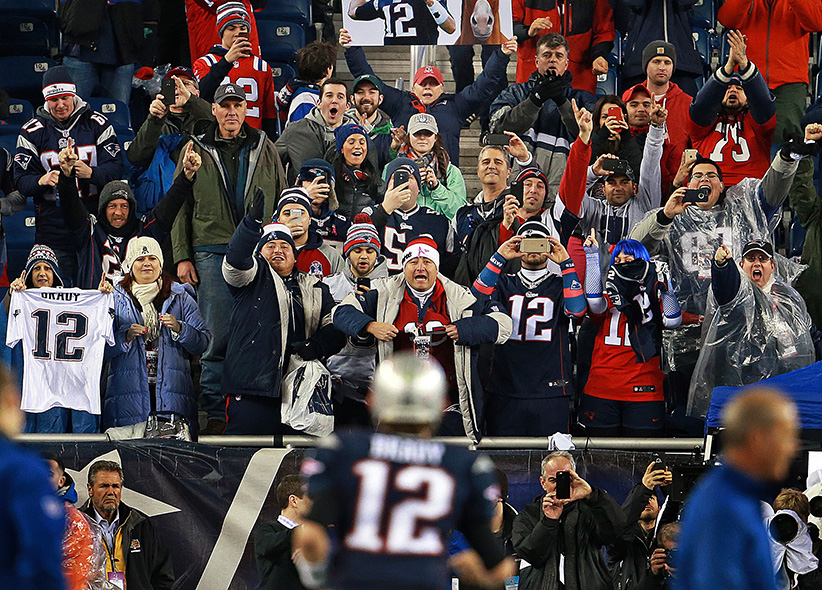Scandals, blunders, criticism: Why does the NFL keep shaking it off?
When the NFL is accused of misogyny and crippling its own players, it’s time for the most popular sport in the U.S. to change
FOXBOROUGH, MA – JANUARY 18: Fans in the south end zone cheer as Patriots quarterback Tom Brady (#12) takes the field for the pre game warmups. The New England Patriots hosted the Indianapolis Colts in the AFC Championship Game at Gillette Stadium. Jim Davis/The Boston Globe/Getty Images
Share

Its current season—which culminates in this weekend’s Super Bowl between the New England Patriots and Seattle Seahawks—has been repeatedly blitzed by scandals and public relations blunders, beginning with the league’s admission of the horrifying toll exacted by on-field collisions. Nearly 30 per cent of former players will develop Alzheimer’s or other dementia-related diseases over their lifetime—at rates 20 to 30 times higher than the general population, depending on age. To settle outstanding claims, the NFL announced it will pay up to $5 million per diagnosed player and has promised stricter concussion protocols during games.
Then it was domestic violence. Baltimore Ravens running back Ray Rice was caught on videotape knocking his fiancée unconscious with his fist. Adrian Peterson of the Minnesota Vikings was arrested for beating his child with a stick. The league’s efforts to contain these incidents were embarrassing, arbitrary and wholly insufficient.
Then, back to concussions. In early January Pittsburgh Steelers quarterback Ben Roethlisberger took a wicked hit to the head in the fourth quarter of a playoff game. He was back playing five minutes later, meaning the league’s 15-minute concussion protocol could not possibly have been applied. Then again, Pittsburgh was trailing at the time. The NFL’s new concussion procedures are mandatory—unless the game is on the line and then, it seems, they aren’t.
All season long the NFL has been beset by critics decrying its apparent culture of misogyny and the morality of a league that systematically cripples its own players. “Consuming as a form of entertainment a game that causes human beings to suffer brain damage is wrong . . . [and] immoral,” writes Steve Almond in his new book, Against Football: One Fan’s Reluctant Manifesto.
So what’s been the impact of such opprobrium and moral outrage?
The NFL remains the most popular sport in America, by a huge margin. It dominates U.S. television ratings like a colossus: the 20 most-watched shows from September to December were all NFL games. As were 45 of the 50 most-watched shows. The best ratings that any other sport could manage was the climactic seventh game of the World Series, which came 21st, far behind many run-of-the-mill, regular-season gridiron match-ups.
The NFL’s oversized players, its’ leisurely pacing and innovative camera work have produced a spectacle perfectly suited to modern big-screen televisions. In a world where PVRs govern viewing habits, the NFL remains one of the few events that demands to be watched live. Media attention has become so intense, something as trivial as the amount of air in a ball can dominate conversation. But does all this mean the NFL is impervious to criticism? Or change?
Leaving aside the tricky philosophical question of whether it’s possible to declare something that enjoys so much public approval to be immoral (this requires determining whether morality is a subjective or objective reality) no pastime can survive indefinitely if it makes everyone else uncomfortable or disgusted. Whatever its massive success at present, the NFL must eventually rid itself of its reputation as an employer of wife-beaters and facilitator of brain injuries. This isn’t the first time its had such problems.
At the turn of the 20th century, American football was beloved by fans for its gritty violence; U.S. president Teddy Roosevelt called it a “thoroughly manly sport.” But it was also widely criticized, and for good reason. In 1905, 18 players died on the field due to head and neck injuries; another 11 were killed the following year. Then the ground shifted. Harvard, Columbia, Stanford and other universities quit football. Politicians and the media talked of banning it. Faced with an existential crisis, and at Roosevelt’s urging, football reinvented itself as a sport of skill rather than brute strength. First downs were lengthened from five yards to 10. Forward passes were allowed. Plays that encouraged head-on collisions were prohibited. The sport went on to ever-greater commercial success.
The modern NFL is at a similar point today. Given its massive fan-base, it may seem foolish to talk of its demise, or even diminishment. Yet it cannot go on forever as presently constituted. Football must change again to reflect current societal values and to protect players’ health. New rules such as eliminating kickoffs, putting independent doctors on the sidelines, and adding more equipment all need to be considered. (One neuroscientist suggests magnets inside helmets would repel hits to the head from opposing players and reduce concussions by 80 per cent.) Off the field, players must be held to a higher standard of personal behaviour.
Football will always be a tough sport. It can’t continue to be a deadly or despicable one.